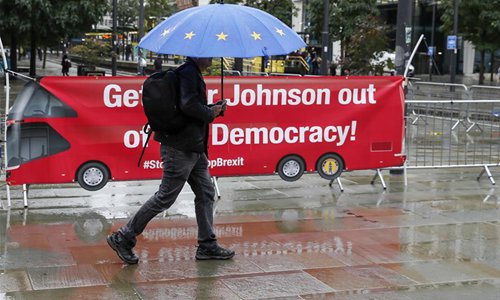HOME >> BUSINESS
Boris Johnson’s Brexit long shot is short of time and leaves a lot to be desired
Source:Global Times Published: 2019/10/10 19:48:41

An anti-Brexit demonstrator walks outside the Manchester Central Convention Complex where the Conservative Party Conference 2019 takes place, in Manchester, Britain, on Sept. 29, 2019. British Prime Minister Boris Johnson ignited the Brexit debate Sunday, saying Britain will leave the European Union next month despite a parliamentary bill forcing him to seek an extension from Brussels if there is no deal. Johnson made his pledge in a television interview in Manchester as thousands of Conservatives arrived for the start of the last big party conference of the year. (Photo: Xinhua)
Boris Johnson has launched a long-shot Brexit plan with a very short timetable. The British prime minister's much-anticipated alternative blueprint for leaving the European Union has several major flaws. But even if Brussels is willing to negotiate a deal in time for a summit due to be held in two weeks, it's far from clear that the UK parliament would pass it.
The best thing about the former London mayor's proposal is that he has finally produced one. As expected, it ditches the so-called Northern Ireland backstop negotiated by his predecessor Theresa May. Her proposal sought to avoid the reintroduction of a hard border with Ireland, but parliament rejected it three times. Johnson's plan would see Northern Ireland effectively submit to EU rules on agricultural and manufactured goods, removing the need for regulatory controls on items that enter the EU single market by crossing the Irish border.
Johnson's plan also has some less appealing features. Northern Ireland would still exit the EU customs union, so goods passing across the border would be subject to customs controls - and potentially tariffs if the UK's approach to trade diverges from the EU's. The British government says many of these checks could be automated or, where necessary, take place away from the frontier. Even if this were feasible, it would be a big shift from the government's previous promise not to introduce a hard border.
Johnson also wants to subject the arrangements to "democratic consent" in Northern Ireland, renewable every four years. This may have been necessary to win the support of the Democratic Unionist Party, whose opposition helped scupper May's Brexit plan. But the Irish government seems unlikely to accept a vague provision that would give politicians across the border the power to unilaterally scupper the deal.
The EU will likely try to keep negotiations going, if only to minimize Johnson's ability to blame Brussels if he fails to deliver Brexit by October 31, as promised, or finds a way to crash out of the EU without a deal. But as long as the prime minister lacks a parliamentary majority, concessions are likely to be small. Any definitive showdown may have to wait until after Britain has again extended the Brexit deadline and Johnson's defiant stance has been tested by voters in a general election.
The author is Peter Thal Larsen, a Reuters Breakingviews columnist. The article was first published on Reuters Breakingviews. bizopinion@globaltimes.com.cn
Posted in: INSIDER'S EYE